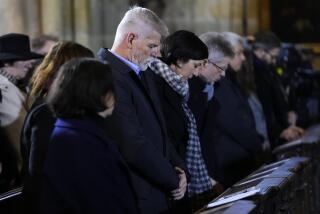In Czechoslovakia, Religion Gets Little Practice
- Share via
PRAGUE — The Czech capital is cluttered with churches, from humble parish chapels to the Gothic grandeur of St. Vitus Cathedral.
But the temples that symbolize the wonderment of faith are mostly empty; the only wonder to most Czechs is why anyone bothers to go.
Czechs are among Europe’s most secular people. According to a European Union survey published last year, 19% of Czechs said they believed in God; most of the rest said they were atheists. Only the former Soviet republic of Estonia had a lower percentage of believers.
Jan Kittrich, a 30-year-old Prague lawyer, is typical. He described himself as an atheist but added that he had nothing against churches.
“I love to visit them,” he said. “But I see them as historical objects, not as religious places.”
The Czechs are not alone. From Ireland to Italy, church attendance across Europe is down drastically. Apart from Western Europe’s rapidly growing Muslim communities and the staunch piety of Poles in the east, religion as a moral force in public life continues to wane.
By all accounts, British Prime Minister Tony Blair is a devout Christian. But when Blair recently told a TV interviewer that his faith informed his world view, he was lampooned and lambasted from the left and right.
Mark Lilla, a professor of social thought at the University of Chicago, has described present-day Europe as “the closest thing to a godless civilization the world has ever known.”
Europeans and Americans share a common civilization and many common values. But in matters of faith and religion, Europe and the U.S. appear headed in opposite directions.
Especially since the 2004 U.S. elections, Europeans have expressed alarm at the increasing intensity of American religiosity. Jacques Delors, former president of the European Commission, has spoken of a widening “values gap” between Europe and the United States that could strain future relations.
But religion has long played an important role in American civic life. God’s name is invoked in the Declaration of Independence and on U.S. currency.
President Bush is hardly the first president to proclaim the United States to be God’s instrument on Earth. John F. Kennedy, in his 1961 inaugural address, declared that “here on Earth, God’s work must truly be our own.”
Europeans are more diffident about God, and the Czechs more so than most Europeans.
Lori Gregory grew up in Philadelphia and is a Christian missionary in the Czech Republic. She and her husband, Bill, an ordained Southern Baptist minister, came to Prague 13 years ago to work for Young Life, a Colorado-based organization that focuses on teenagers.
“When we bring up the subject [of faith], it’s like asking if you believe in UFOs. That’s what we’re up against here,” Gregory said. “In the States, you can assume most kids know why Christmas is celebrated. In the Czech Republic, kids think baby Jesus is like Cinderella or Shrek. ... They think it’s all a fairy tale.”
Given four decades of communist rule, perhaps that is not surprising. Kittrich, the lawyer, grew up in a small town in Moravia. He had one grandmother who told him stories from the Bible, and another, a police colonel, whose home was filled with statues of Lenin and Stalin. “That was her religion,” he said.
His mother, he said, was a member of the “hippie generation” that rejected all religions and ideologies. Kittrich’s first encounter with a church group came while he was a teenage exchange student in Elkin, N.C. He began attending services at the local Methodist church.
“Three times a week there were church activities -- suppers for homeless people, youth groups. I joined the soccer team. The people were really nice and it opened my eyes,” he said.
“But it always seemed more of a social community than a religious community, so when I got back here, I didn’t follow up.”
Kittrich acknowledges he often thinks about religion. “But I don’t think I’m missing anything,” he said with a shrug.
Tomas Halik, a Roman Catholic priest and professor of philosophy at Prague’s Charles University, is not surprised at spiritual indifference. He thinks Czechoslovakia’s communist rulers and their masters in Moscow targeted the country for “an experiment in the total atheization of society.”
The crackdown on the church and clergy was harsher than in neighboring Poland, Hungary or even the Soviet Union, and decades of repression did serious harm to the Czech religious identity, Halik said.
“Czech society is not really atheistic; it’s worse,” he said. “Czechs today hardly know anything about religion.”
Halik, who likes to joke that he “converted from agnosticism,” was secretly ordained in East Germany in 1978.
During the communist era, he became known as a spokesman for the Charter 77 group, which played a key role in the 1989 Velvet Revolution that ended communism. In those years, he kept his ordination a secret from everyone, including his mother.
Now, he leads a small but robust Prague congregation made up mostly of university students. He has baptized about 800 adults over the last dozen or so years.
“After 1989, there was a great expectation that the church would be an important force for the renewal of the nation,” Halik said.
When Pope John Paul II visited Czechoslovakia in 1990, huge crowds turned out to greet him. But when he returned for a third, and final, visit in 1997, the crowds were embarrassingly thin. (Among Czechs who claim some religious affiliation, 83% are Roman Catholic, 10% are Protestant and 6.4% are Orthodox, according to EU figures.)
Halik said the Czech Catholic Church wasted a golden opportunity in the early 1990s, mainly because it had no experience in public life and most of its priests “only knew how to operate in the old communist style -- the liturgy and nothing more.”
Dusan Trestik, a historian at the Center for Medieval Studies in Prague, agreed. “I think you have to say the church failed in the needs of modernization,” he said. “The church was offering traditional Christianity for grannies. You had 18- to 20-year-olds, and the church didn’t know how to speak to them.”
But Trestik noted that the Czechs’ standoffishness toward religion predates the communists by centuries. Christianity arrived in the Czech lands in 865, but its defining moment came in the early 1400s when Jan Hus, rector at the University of Prague, challenged the authority and teachings of Rome. For this, he was burned at the stake.
“In all aspects, it was a Protestant Reformation a century before Protestantism,” Trestik said. “But the Hussite revolution ended like all revolutions -- badly. The Hussites mutually defeated each other.”
The Czech lands fell under the control of the German-speaking Hapsburgs. Catholic authority was restored, but Czechs henceforth regarded the church as something imposed from the outside.
When Czechs identify themselves as atheist, they usually don’t mean it in the strict sense. When pressed, most acknowledge they believe in “something.”
“Even rational people need to believe in something, something bigger than themselves, to make sense of their lives,” said Dana Hamplova, a Prague sociologist whose research has found that although Czechs mistrust organized religion, they rank high among Europeans who believe in fortunetellers, amulets and nontraditional spirituality.
“They are looking for something, for guidance, and in the pure sense, it’s religious,” she said.
Pavel Rican, a religion professor at Charles University, refers to this as “somethingism” and describes it as “degenerated religiosity” that has become the norm in much of Europe.
“Superstitions, cults, interest in herbs -- there are so many people now to whom salvation means good health,” he said.
What caused the demise of traditional religion among Czechs and other Europeans? Is it the fault of the church, or did the faithful change in some fundamental way?
“I go to church infrequently. It’s boring. It gives me nothing,” Rican said. “The songs are 400 years old, and what is said there, it doesn’t address what people need, and I’m afraid the churches don’t even try.
Grace Davie, a British expert on the sociology of religion, says the church already has “lost its role as the keystone in the arc of European culture.”
George Weigel, a leading American Catholic intellectual, goes further. He argues that Europe is becoming a “post-Christian society” with a ruling elite openly hostile to religion.
“It would be too simple to say that the reason Americans and Europeans see the world so differently is that the former go to church on Sundays and the latter don’t,” Weigel wrote in his 2005 book, “The Cube and the Cathedral: Europe, America and Politics Without God.”
“But it would also be a grave mistake to think that the dramatic differences in religious belief and practice in the United States and Europe don’t have something important to do with those different perceptions of the world -- and the different policies to which those perceptions eventually lead,” he wrote.
Pope John Paul II believed that Europe’s poverty of spirit was linked to its postwar affluence, or, in the specific case of Eastern Europe, to its post-communist embrace of American-style consumerism. But the American experience suggests that spirituality and consumerism need not be mutually exclusive.
Europeans, including many who are religiously inclined, tend to be openly disdainful of American-style religiosity.
“This kind of do-it-yourself Christianity -- people like Billy Graham and Jesse Jackson and all the TV preachers -- would be impossible in Europe,” said historian Trestik, calling it “supermarket” Christianity.
But European religious leaders are at a loss for ways to staunch the deterioration of faith.
Although some are trying to make the institutional church more accessible and user-friendly, the Catholic Church, by far the continent’s largest denomination, seems to be consoling itself with a “less is more” approach, arguing that the numbers in the pews matter less than the depth and quality of faith of those who do believe.
“We know we can’t go back to the Catholic Europe of the Middle Ages, so we will have to find some compatibility between Christianity and secular humanism,” said Halik, the secretly ordained priest.
But can Christianity and secular humanism ever be compatible?
“Faith and doubt are like two sisters,” Halik said with a smile. “They need each other.”
More to Read
Sign up for Essential California
The most important California stories and recommendations in your inbox every morning.
You may occasionally receive promotional content from the Los Angeles Times.












